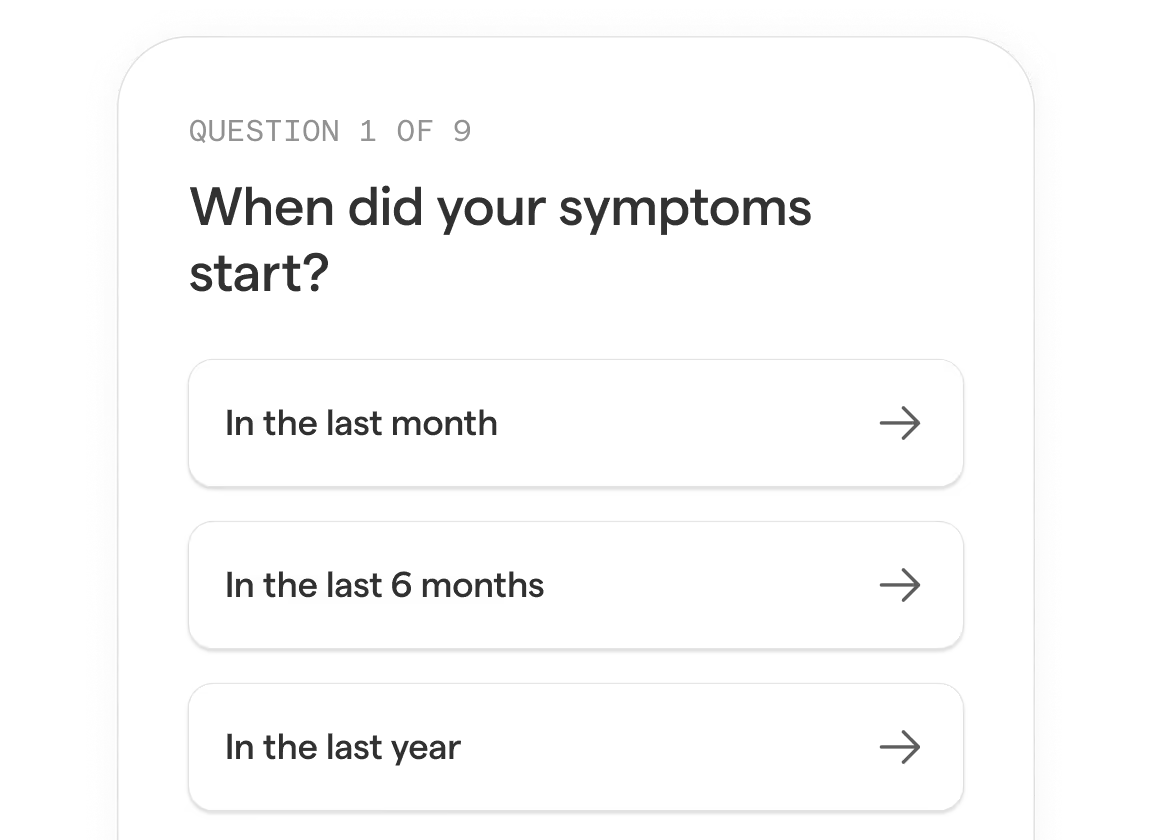Download the Felix App
Earn reward, visit our shop and get exclusive offers on the app
Download now


With Felix, you can get a Nuvaring prescribed by a licensed healthcare practitioner and delivered to your door for free.
Birth control ring contraceptives, also sometimes simply called vaginal rings, are a form of protection against being pregnant. They are inserted into the vagina, where it is left for 3 weeks at a time.
Vaginal birth control rings contain two different female hormones, estrogen and progestin.
For those searching for a specific type of birth control ring, the brand name Nuvaring is available through Felix’s pharmacy partners across Canada. The generic name for this type of birth control is Haloette.
If you’d like to learn more about birth control ring contraceptives, or the brand Nuvaring, you can click here for more valuable information.
For those asking “how does a vaginal ring work?”, they function in the same two ways as other combination hormonal contraceptives:
Nuvaring specifically has been shown to have a 98-99% effectiveness rate as a vaginal ring contraceptive. This makes it one of the most effective forms of protection against unwanted pregnancy; especially when used in combination with other barrier-method contraceptives (i.e., condoms, spermacide, etc).
The most common side effects that could be experienced when using hormonal birth control rings include:
These side effects of birth control rings are normal, and they may lessen as your body adjusts to this form of contraceptive over time.
Most people don’t experience any kind of side effects from birth control ring contraceptives, but those that do typically find that side effects disappear within 1-3 months of presenting.
There are some more serious side effects to be mindful of, so be sure to let your practitioner know right away if you start to experience:
In these scenarios, your practitioner may want to suggest an alternative contraceptive to birth control rings, which could still provide you with protection against unwanted pregnancy, with less negative interactions.
There are a number of people who shouldn’t use hormonal vaginal rings, including those who:
In addition to these people, there are others that should be extra cautious when using hormonal birth control rings. Be sure to let your practitioner know before starting birth control ring contraceptives if you:
If any of the above apply to you, your practitioner may want to suggest an alternative birth control contraceptive method than rings, which may reduce your chances of experiencing negative side effects or symptoms.
SIDE NOTE: There are a substantial number of prescription medications that could cause interactions with Nuvaring, so be sure to let your practitioner know about any/all other medications or treatments that you’re using, prior to requesting a prescription for birth control rings.
In addition to the high levels of protection that are offered by using vaginal birth control ring contraceptives (98-99% effective), the fact that these rings only need to be changed once every 3 weeks, makes it much easier to take your prescription accurately.
With oral birth control pills that need to be taken at the same time daily, it can be a challenge to ensure you take them at the same time, each day, without fail. Missing doses can lead to reduced protection, and in some cases, unwanted pregnancy.
In fact, even birth control patches need to be changed every week, so apart from birth control injections and intrauterine devices (IUDs), hormonal vaginal rings are one of the best ‘set it and forget it’ type of birth control.
Vaginal birth control ring contraceptives are between 98-99% effective, when used accurately as per its directions.
This medication follows a 28-day cycle, where you insert the birth control ring, leave it in for 3 weeks, and then remove it for a 7-day period before replacing it.
In order to achieve the maximum vaginal ring effectiveness, this usage schedule needs to be followed effectively.
Also, if you’re concerned about small chances of pregnancy with hormonal vaginal rings, you can also combine with other barrier forms of contraceptives, such as condoms, spermacide, etc.
Vaginal birth control rings aren’t the only contraceptives in town. There are lots of other options, if you don’t think that hormonal vaginal rings are the right choice for you. Birth control is an incredibly personal thing, so you should try to find something that makes you feel the most comfortable and protected.
There are a number of different options you can consider within the family of hormonal birth control, such as: birth control patches, birth control pills, hormonal IUDs, and even injections.
There are also a number of non-hormonal birth control methods that you can try, such as:
These non-hormonal birth control methods may not offer 99% protection like hormonal vaginal rings, but in combination with hormonal treatments or multiple barrier methods, you can increase your protections against unwanted pregnancy.
Further reading








Before you can access prescription hormonal vaginal rings online in Canada through Felix, you’ll need to get assessed by a licensed clinician, who can determine whether a ring is right for you (based on your health and medical history).
If they believe that ring contraceptives make sense for you, based on your individual needs, they can provide you with a prescription for it.
Best of all, Felix and our pharmacy partners can then fill your prescription for you and deliver your ring, at no additional cost to you! You’ll just have to pay a small initial assessment fee, as well as the cost of any prescribed medications offered by your assigned practitioner.
This is a question that’s impossible for Felix to answer generally, because every private insurance company and benefits package will look a little different from one another. We’d suggest reaching out to your insurance rep directly, before you make your request with Felix.
This way, if you do have any coverage to get Nuvarings online in Canada, you can provide it to your practitioner during the assessment process, so that Felix can bill your insurer for you!
That’s right! It’s just another way we’re helping you seamlessly take back control of your health and happiness.
In regards to provincial health coverage for Nuvarings, this will vary from province-to-province, depending on where you live in Canada. What’s available for some coverage in some provinces may not be available in others.
Also, any provincial coverage will only be available to those that meet certain criteria for eligibility, so if you check your local government page for more information, you can see whether there is coverage in your area and what is required to access it.
You may be able to buy Nuvarings online in Canada through Felix, but before you can request a prescription for ring contraceptives, you’ll need to get evaluated by one of our licensed healthcare practitioners.
It only takes a few minutes to complete your online assessment through our secure platform, and then one of our clinicians will respond to your request, usually within 24 hours of its submission.
If they believe hormonal vaginal rings are the right choice for you, not only can they provide you with a prescription, but if you want, Felix’s pharmacy partners can fill and ship your rings to you at no cost!
We can even arrange ahead of time for ring refills to be delivered (discreetly) to your doorstep, before you need them. This way, you’ll always have the protection you need, when you need it.
This is just one of the ways that Felix is helping Canadians take back control of your health and quality of life, so that you can get back to living life on your terms - the way it should be.
Felix is Canada’s first truly integrated healthcare platform. We provide on-demand treatment for everyday health needs like weight loss, mental health, sexual health, and more. Founded in 2019, our digital-first approach to healthcare includes everything from diagnosis to prescription — all accessible from the comfort of home.
No. Felix provides a faster, hassle-free way for you to get a treatment plan for certain conditions, but our service does not replace your primary care provider. For matters that extend beyond obtaining a lifestyle treatment safely and easily, we encourage you to consult your primary health practitioner in person — whether for checkups, personal health concerns, or to inform them about your current treatments or treatment plans.
Absolutely. Our online assessments have been designed to ask all the necessary questions required for diagnosis. We've worked with specialists to create an assessment process that can provide sufficient information for the healthcare practitioner to determine whether or not you are eligible for a prescription and craft an appropriate treatment plan.
Call 911 or proceed to your nearest emergency room immediately. Felix is not intended for medical emergencies. Once the emergency has been addressed or resolved, contact your prescribing practitioner to inform them of your experience as this may impact your current treatment plan.
Anyone who is 18 years or older (16 or older for acne and birth control prescriptions), and is located in Alberta, British Columbia, Manitoba, Newfoundland and Labrador, Nova Scotia, Prince Edward Island, Saskatchewan or Ontario. We cannot ship treatments outside of these provinces at this time.
After creating an account, you will complete a medical assessment for evaluation by one of the Felix healthcare practitioners.
During your assessment, you will have the opportunity to send your practitioner questions via secure messaging.
In most cases, practitioners will complete your assessment with secure messaging alone but sometimes they may determine you require an audio or video visit and/or further diagnostic testing to help determine the best treatment plan for you.
If your practitioner has determined a prescription treatment is appropriate, they will approve your visit and write you a prescription. Our pharmacy will then ship your prescription to your home.
You’ll be able to message your healthcare practitioner if you have questions or want to make changes to your treatment at any time.
No. We use an asynchronous telemedicine model so you can complete your online visit in your own time and we save your progress so you can come back later to finish it.
If you are completing a visit in the mental health or weight loss categories, your healthcare practitioner may require a phone or video call to discuss your medical profile further during the assessment process.
Most assessments do not require a phone or video conversation. Once a prescriber has reviewed the info in your assessment they will respond to you via secure instant messages that you can access within your Felix account.
If you are completing a visit in the mental health or weight loss categories, your healthcare practitioner may require a phone or video call to discuss your medical profile further during the assessment process.
You can expect to receive a response from a healthcare practitioner within 24 hours of submission. If you’ve been waiting longer than this, please reach out to our Patient Support team through the chat bubble in the bottom right corner of your account or our Contact Us page.
No. A visit with a licensed healthcare practitioner is required for all treatments currently provided through Felix’s service.
Not long. After completing your assessment, a practitioner will generally respond within 24 hours, and often much sooner.
Treatment plans will be processed within 2-4 business days of your approval date if there is nothing blocking fulfillment.
All packages usually takes 2-3 business days. You will receive an email with your tracking number once your treatment has been shipped.
Absolutely. All Felix shipments arrive in a nondescript blister package so you can have your treatment shipped wherever makes sense for you as long as there is someone there to sign for it.
A signature upon delivery may be required.
There is currently no cost to have your treatment shipped to you from our Felix Pharmacy network.
Yes, your security is paramount to Felix’s mission. Personal health information provided during your medical assessment is strictly and legally confidential between you and the Felix healthcare practitioner.
Beyond that, all your account information (including the medical assessment, credit card, and shipping information, etc.) is also stored safely and securely. Felix is compliant with all federal and provincial health privacy legislation. It is our duty to protect your data with comprehensive security infrastructure and stringent data policies to ensure it stays private and secure.
Read more on our Privacy Policy.
Yes! In Canada, only a licensed healthcare practitioner can write a prescription, and only a registered pharmacist can fill that prescription. We are supported by leaders in the Canadian pharmacology and specialized medical fields. Felix adheres strictly to all the regulations set forth by all applicable Colleges of Pharmacists and Colleges of Physicians and Surgeons in which we operate.
Absolutely. All prescriptions obtained via Felix are provided by licensed Canadian healthcare practitioners—the same as you would get at a hospital, doctor’s office, or clinic. These practitioners do not provide prescriptions unless they deem it medically safe and appropriate to write them based on your medical profile and assessment answers. Our assessments have been crafted by the practitioners on our medical team. Finally, all Felix Pharmacies are provincially accredited just like any retail pharmacy.
Your privacy is our top priority. All your data is 256 bit SSL/TLS encrypted, and we take significant steps to keep your data secure. You can read our Privacy Policy for more information.
Felix charges a fee for the online visit. In most cases the fee is $40 but varies by treatment category. The visit fee includes a prescription valid for up to a year (depending on the condition) and on-going support from the healthcare practitioner or pharmacist.
It depends. Treatment costs vary but will be in line with what you would pay at a pharmacy in person. You will see the estimated cost of your treatment before insurance, during the online visit but will only be billed for medication costs for your prescription once it is approved and sent to our pharmacy. Once approved, your treatment and payment will be processed within one to two days.
Keep in mind that you won’t necessarily need to pay the full price yourself. If you have insurance, Felix’s partner pharmacies will bill your insurer directly. You may also be eligible for financial support in your province.
We accept all major credit cards for any aspect of your treatment not covered by insurance or other financial support
Treatment coverage varies greatly between different insurance plans.
The good news is that if you are covered, Felix can bill your insurer directly, and then process your treatment plan at no additional cost to you. We recommend that you upload your private and/or provincial benefit card during the online visit so that our pharmacy partner can apply any coverage you are eligible for before processing your treatment plan.
Insurance coverage for treatment plans through Felix doesn't include the cost of your visit.
A Felix online visit is considered asynchronous since it is conveniently completed through a secure chat bases system. Currently, asynchronous visits are not covered by insurance or provincial health plans so you will be charged a visit fee, depending on the category of treatment you are requesting.
Medication coverage varies greatly between different plans, provinces, and has specific criteria that determine eligibility. For private insurance, we recommend contacting your benefits administrator with your details and the Drug Identification Number (DIN) and the drug name to determine your coverage.
For more details on provincial health plan coverage see below:
Alberta: Learn more about AHCIP here. Search for covered drugs here.
British Columbia: Learn more about MSP here. Search for covered drugs here.
Manitoba: Learn more about MHSIP here. Search for covered drugs here.
Newfoundland and Labrador: Learn more about MCP here. Search for covered drugs here.
Nova Scotia: Learn more about MSI here. Search for covered drugs here.
Ontario: Learn more about OHIP+ here. Search for covered drugs here.
Prince Edward Island: Learn more about Health PEI here. Search for covered drugs here.
Saskatchewan: Learn more about Saskatchewan Health Coverage here. Search for covered drugs here.












